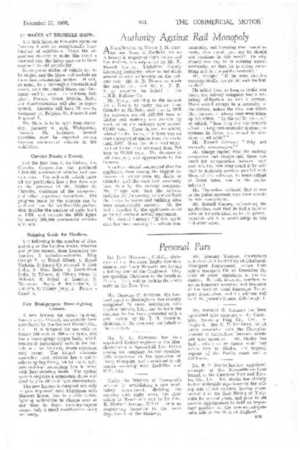Authority Against Rail Monopoly A N application by Messrs. J. H.
Page 21

If you've noticed an error in this article please click here to report it so we can fix it.
Gratton and Sons, of Sheffield, for an A licence in respect of eight lorries and five trailers, was adjourned by Mr. E. Russell Gurney, Yorkshire Deputy Licensing Authority, after he had made several pointed comments on the railway case. Mr. A. B. Thornelow made the application, and Mr. II. F. R. Sturge objected on behalf of the L.N.E. Railway Co.
Mr. Sturge, referring to the request for a licence to carry timber from Grimsby to Sheffield, said that in 1927 the railways carried 162,309 tons of timber and nothing was carried by road, whilst the railways now carried 64,000 tons. These figures, he added, related to the docks, and there was no road transport of timber from the docks until 1932. Since that date road transport of timber had increased from 798 tons to 33,000 tons. The decrease in rail transport was approximate to the increase.
A railway official commented that the applicants were among the biggest removers of timber from the docks at Grimsby, an3 the work had previously been clone by the railway company. Mr. Sturge said that the railway facilities for the carriage of timber from the docks to towns and building sites were commercially suitable. All the traffic handled by the applicants could go by rail without adding equipment.
Mr. Russell Gurney "If this applicant has been running his vehicle .con tinuously, and licensing them continuously, why should you say he should not continue in this work? Or why should you say he is running uneconomically, or that he is doing something not in the public interest? "
Mr. Sturge "If he were running uneconomically, we should wait for him to die."
He added that, so long as traffic was there, the railway company had a statutory obligation to run a service. There would always be a necessity of the service, unless the view was taken that the sooner railway lines were taken up the better. "In the public interest," he added, "how long can the country afford to keep two mutually destructive systems in force, one bound to continue at all costs?
Mr. Russell Gurney : "Why. not mutually co-operative?"
Mr. Sturge replied that the railway companies had always said there was room for co-operation between road and rail, but how long could it be said that to maintain services parallel with those of the railways, to some extent at lower rates, was in the public interest?
Mr. Thornelow declared that it was in the public interests that there should be fair competition.
Mr. Russell Gurney, adjourning the application, said that he had a definite view in his own mind as to the general principle which he would adopt in this and other cases.












































































